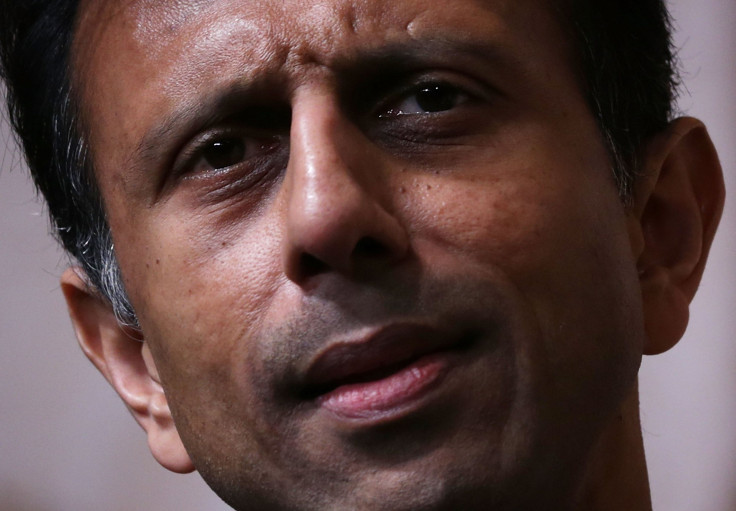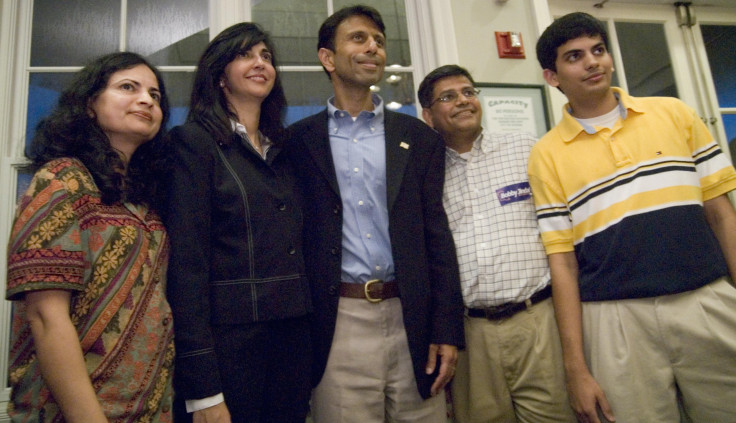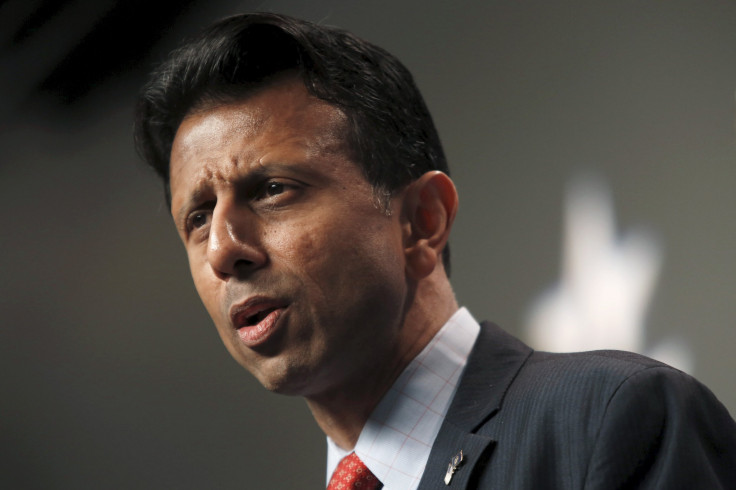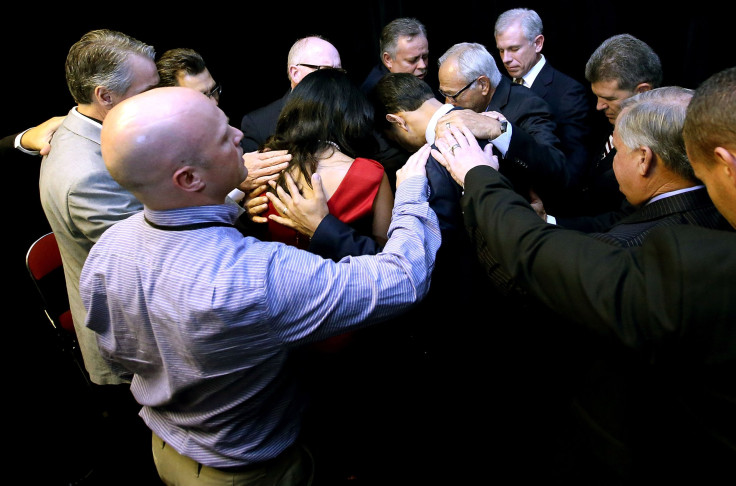Bobby Jindal Campaign: Some Indian-Americans Offended By Republican Candidate's Views On 'Hyphenated' Americans

Subodh Chandra, 48, remembers feeling a swell of pride watching the meteoric rise of a young Piyush “Bobby” Jindal, an Ivy League graduate and Rhodes scholar who would later become governor of Louisiana at just 36. As Jindal became more well-known on the national stage, Chandra, a Stanford grad who said he was a Rhodes scholar finalist himself, continued to root for Jindal’s success.
But years later, after Jindal announced his intention to run for the 2016 Republican presidential nomination, becoming the first Indian-American candidate for a major party, Chandra sees Jindal in an entirely different light. Despite his parents immigrating to the United States from Khanpur, India, Jindal said during his campaign announcement that he was raised an American, not an Indian-American, and called for others to embrace the idea of a “hyphen-free” America.
Chandra, like many other Indian-Americans, felt like Jindal was washing over his Indian identity. “He’s somebody that tried so badly to assimilate into majority culture,” Chandra said. “I’m proud to be an American, but not at the expense of disavowing my parents … my culture.”
Amid suggestions that Jindal is perhaps suppressing his Indian background, some Indian-Americans say their main critique is not about Jindal’s own identity as an American. Rather, it’s about the candidate’s perception of their hyphenated American identity. Jindal perhaps holds no obligation to be a vocal flag bearer for Indian-Americans. But with a growing Indian-American population that is taking an increased presence on the national stage, there’s a sentiment that Jindal -- the nation’s most prominent Indian-American politician -- is proposing a version of being American that disallows for pride on either side of a hyphenated existence.
“He’s unable to see that what makes America great is that it’s a mosaic,” Chandra said.
Piyush Becomes Bobby
Jindal was born in Baton Rouge, Louisiana, in 1971, and went on to attend Brown University in Rhode Island and Oxford University in England. He married Supriya Jolly Jindal in 1997 and the couple have three children -- ages 10, 7 and 5. Supriya Jindal, an engineer, converted to Catholicism early in their marriage, apparently with encouragement from her husband, who had converted as a young man.
Jindal soon shot up the ranks of government, serving as assistant secretary for the U.S. Department of Health and Human Services in 2001 for President George W. Bush and then as a congressman from Louisiana after his first run for governor of the state was unsuccessful in 2003.
Jindal’s background has always been a talking point, even before he eventually became the first Indian-American governor in a 2007 election that saw him pick up 54 percent of the vote and win 60 of 64 parishes in a state in the Deep South. A common perception was Jindal failed in his first gubernatorial run because of concerns about his background.

In 2009, following President Barack Obama’s first address to Congress, Jindal was selected to give the GOP’s response, but his televised appearance was widely panned for his folksy approach that came off as timid and awkward. It was largely a failure in what was supposed to be a big moment for Jindal and a signal of growing diversity in the Republican Party.
Jindal won re-election as governor in 2011 and after his 2015 presidential announcement, the discussion surrounding his background took on a new fervor. Prior to his first campaign speech, the Washington Post ran a story detailing Jindal’s life, titled “From Piyush to Bobby.” Piyush is Jindal’s given name, which he changed to Bobby in his youth, inspired by a character on the television show “The Brady Bunch.” The Post article suggested that Jindal’s camp had asked for Indian friends and family to wear “Western” dress to gubernatorial campaign events in the past, which Jindal denied. With time, some of his support from Indian-American donors and supporters began to fade.
Recently, a lot has been made of a portrait in Jindal’s office that appeared to show the governor with much lighter skin. While not Jindal’s official portrait, it hung in the governor’s office, and shows a lighter-skinned governor leaning against a pillar. Social media users responded with swift criticism, sending snarky posts about the painting and tweeting side-by-side images of Jindal and his portrait. For some, it became an apparent case of whitewashing his image.
Later, during his campaign launch speech, Jindal addressed the idea of hyphenated Americans. "We are not Indian-Americans, African-Americans, Irish-Americans, rich Americans, or poor Americans. We are all Americans," he said. Jindal appears committed to the idea, saying last week in New Hampshire that he was “tired of all the hyphenated Americans,” according to WMUR-TV in Manchester. Jindal’s campaign was not immediately available for comment for this story.
The online community, Twitter especially, has responded to his remarks critically, with the hashtags “Bobby Jindal Is So White,” and “Jindian.” The campaign's own hashtag "Ask Bobby" prompted more ridicule, with users rapidly questioning the governor on many issues, including his nonsupport of same-sex marriage, his stance on abortion and his name change.
“I do think that people are taking a critical lens about his policy and his rhetoric,” said Deepa Iyer, former director of the nonpartisan, nonprofit organization South Asian Americans Leading Together in Maryland. “I think it’s about that assimilation narrative, giving up your hyphenated identity in turn for an American one, whatever that means.”
For their part, the Jindal campaign responded with a new slogan, "tanned, rested and ready" -- borrowed from a 1988 joke about a political comeback by President Richard Nixon -- in response to what they felt was the left questioning the candidate’s background.
Bobby Jindal posing next to a portrait of David Schwimmer from ‘Friends’. pic.twitter.com/XnfiOwQvJ1
— Rusty Redenbacher (@rustymk2) June 24, 2015A Growing Community
Indians began migrating to the United States as early as 1820 and as of 2013 there were more than 2 million Indian-born immigrants in the United States, according to the Migration Policy Institute. They account for the second-largest immigrant group in the United States -- smaller in number than Mexicans, but more numerous than immigrants from China. The large influx of Indian migration came after the 1965 Immigration and Nationality Act, with many professional and highly skilled Indians coming to America. Indian-Americans as a whole earn a median income of $88,000 with almost 70 percent holding a bachelor’s degree or higher, according to Pew.
Indian-Americans have also asserted a more prevalent presence in pop culture in recent years. Actress Mindy Kaling has her own show “The Mindy Project” and previously starred in the hit show “The Office.” Popular stand-up comedian Aziz Ansari is of Indian heritage and Indian actress Freida Pinto has represented major brands like L'Oréal. But perhaps none hold the influence of Jindal, who has continually broken new ground for Indian-Americans in politics and will be in the spotlight as election season ramps up.
Despite the growing spotlight on the Indian-American community, one of the overarching issues Indian-Americans have struggled with is the push for a sort of general acceptance among other Americans, said Shalini Shankar, director of the Asian-American studies program at Northwestern University in Illinois. She has studied the South Asian diaspora and listed the New York/New Jersey area, Houston, the San Francisco Bay area, Chicago and the Los Angeles area as some of the more popular regions where the nation’s 3.2 million Indian-Americans choose to live.
“[It’s] just a broader struggle in general for recognition and inclusion, and being a part of American citizenry,” Shankar said. After the terrorist attacks on Sept. 11, 2001, there was also an uptick in religious discrimination, she said.
Versha Sharma, 29, remembers specifically being told to “get back to Afghanistan,” on 9/11 despite being born and raised in Louisiana. She’s from the central Louisiana town of Alexandria, but her parents immigrated to the United States from northeastern India in 1978. Her close-knit Indian-American community worshiped together and celebrated holidays in an area that wasn’t always accepting of their culture.

Sharma, who calls herself a proud American and patriot, produced a video for NowThis News that detailed her many issues -- especially as an Indian-American from Louisiana -- with Jindal’s stances concerning Indian-Americans. “He is denying the experiences others have had,” she said. “I wouldn’t publicly criticize him … if he didn’t deny my experience … really any minority experience.”
For some Indian-Americans, however, Jindal isn’t even on the radar. New York City is home to one the nation’s most well-known Indian neighborhoods. In Jackson Heights, Queens, shops sell bright, traditional saris and Indian restaurants featuring spicy curries line the streets. Yet the country’s first Indian-American candidate elicited little more than shoulder shrugs on a recent day. Business owners said they didn’t know enough about Jindal to comment and hurried back to counters. People on the street mainly said the same. The most opinionated response called Jindal a “strong leader,” but not as strong as, say, Hillary Clinton. It was a lukewarm counterpoint to a sometimes heated conversation.
Identity Politics
Jindal is not the first, nor will he likely be the last, presidential candidate to have his or her ethnic identity questioned. The nation’s population is growing more diverse, forcing candidates to grapple with how they present their heritage and background. As a candidate, President Barack Obama talked about his black father and white mother, growing up in Hawaii and forming his identity as a black man in Chicago. Republican presidential candidate Marco Rubio has often touted his Cuban heritage on the campaign trail, connecting his upbringing with generations of immigrants who realized the so-called American dream by working hard. Fellow GOP presidential candidate Ted Cruz was born in Canada to a Cuban father and a mother from Delaware, but he officially renounced his Canadian citizenship in 2014 and does not identify as Latino.

Rohit Chopra said he wasn’t necessarily a Jindal supporter, but that Jindal might see increased scrutiny from some Indian-Americans because he didn’t embrace the Hindu religion. Chopra, originally from India, has lived in the U.S. for 15 years and is a professor of communications and media at Santa Clara University in California. He said if Jindal were a conservative Hindu -- and not a conservative Catholic -- the Republican candidate would have seen more support from the Indian-American community.
“What adds insult to injury [for some] is he has the perfect Indian-American profile,” Chopra said. “He’s an academic overachiever … [Jindal] would be the ideal son-in-law.”
And while Chopra was troubled by some of Jindal’s ideas about identity, he said some of the online response to Jindal’s campaign launch “wound up becoming silly.”
Shaifali Puri said that the “dark humor” online, however, was simply a fitting response to Jindal’s outrageous statements. The nonprofit executive in New York City grew up in Atlanta, with Indian immigrant parents. “It really is that Bobby Jindal is suggesting that the rest of us who do not embrace his whitewashed version of assimilation [are] not American enough,” she said.
'Race Is Something That Follows You'
Jindal currently lags in the polls and is considered a long shot with little chance at landing the 2016 GOP nomination. His popularity, both in Louisiana and nationally, has fallen a long way since his early ascent to stardom in the party. In his early years, he enjoyed a fair bit of success motivating Indian-American backers, and there remains some pride within the community that one of their own had broken new ground. Even if Jindal distances himself from a hyphenated identity, he remains the first Indian-American governor and presidential candidate from a major party, his supporters say.
Simran Jeet Singh’s family came to the United States from Punjab, the same region in India from which Jindal’s family hailed. Singh, a senior religion fellow at a community organization called the Sikh Coalition, grew up in San Antonio and now lives in New York City. Singh said he was conflicted on Jindal, who he finds problematic, but he also had a certain amount of hope in seeing an Indian-American become a presidential candidate.
“One of the things that I’m happy about is that having someone with South Asian heritage [as a candidate] will open doors for a large [group of] people of minority communities, immigrant communities,” Singh said. “On the other hand, I feel disappointed that someone with whom I share a heritage feels as if that heritage needs to be erased in order succeed politically in America today.”
Aru Sahni said he grew up in a fairly “Anglicized household,” feeling that he was straddling cultural lines. The 30-year-old computer scientist from Pittsburgh who now lives in Washington, D.C., was born in India and came to the U.S. when he was 3 years old. He suggested that people want to get behind an Indian-American candidate. But there’s a lingering disappointment with a candidate who might not get behind them.
“I don’t think you have to be an Indian-American or an American,” Sahni said. “You are both. … Race is something that follows you, it’s a social construct you don’t put yourself in.”
© Copyright IBTimes 2024. All rights reserved.












